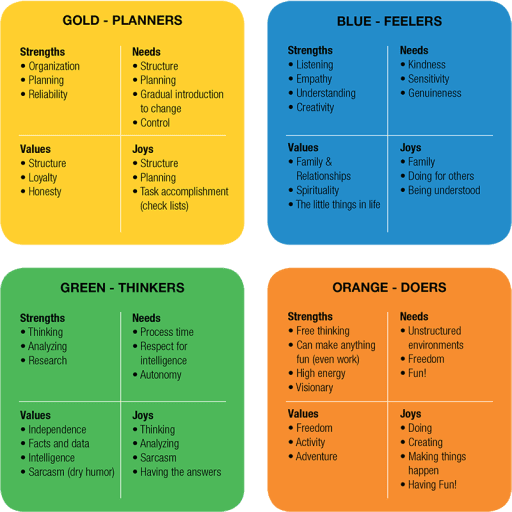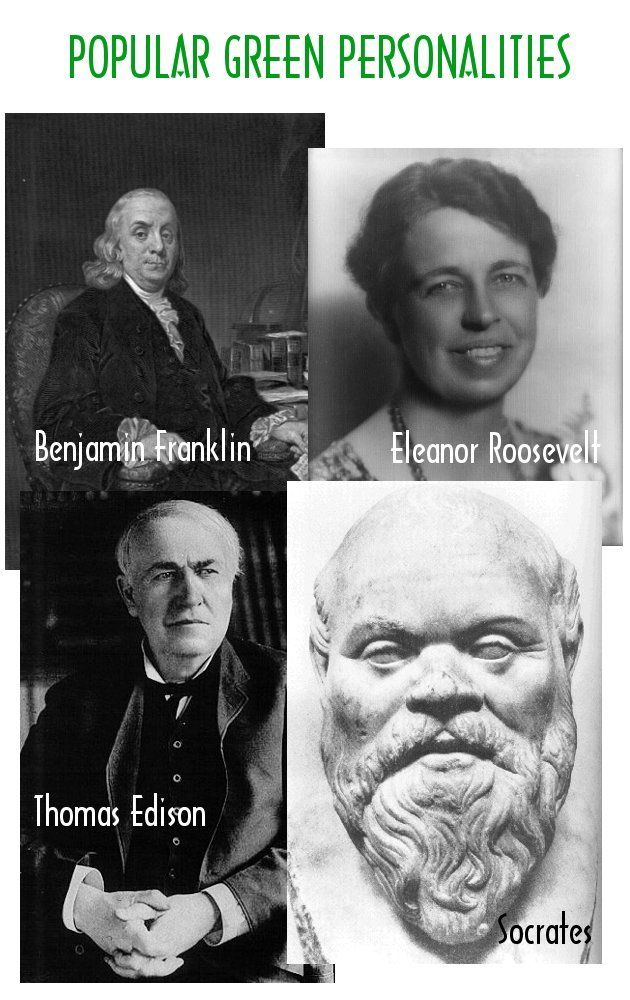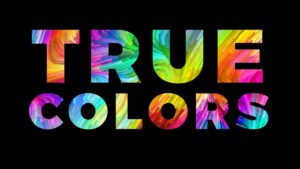What is the Green True Colors Personality Type?

The Green True Colors Personality Type is known as the Cognitive-Oriented Personality Style.
- They are natural visionaries.
- Greens value intelligence, fairness, and justice.
- They are calm, relaxed, and collected.
- They seek knowledge and understanding and live life by high standards.
- Greens are non-conformists, abstract, hypothetical, logical, investigative, and inventive problem solvers.
As a primary green, you might put your faith in facts.
You could enjoy finding new solutions to old problems, and you might care about acting within your morals as much as you care about being correct.
Your friends and family might regard you as “the voice of reason” within your circle.
Your intellect and thirst for knowledge could make you suitable for a career as a professor, computer systems analyst, or economist.
Authority and developed corporate structures may present problems for you, however.
You may enjoy making decisions and thinking for yourself and could take issue with others being in command.
You might struggle to accept criticism and feel insecure when others prove you wrong. You might use humor or sarcasm to cope or could become withdrawn.
As a green, you might think of yourself as level-headed and unemotional. However, that doesn’t necessarily mean you don’t experience emotions. You may suppress your feelings or feel disconnected from them.
You may only confide in close friends or a professional. Reaching out to a therapist could be beneficial if you relate to this, as studies indicate that suppressing emotions can be unhealthy.
Green Personality Type cross-reference
- Keirsey Type – Rationals
- Temperament Type – Choleric
- Animal Type – Lion
- DISC Type – Dominant
- Socio-Communicative Type – Driver
- Color Code – Red
- Personality Compass – North
- Occupational Type – Enterprising
MBTI Personality Types (xNTx) – Intuition and Thinking
Enneagram Types
- Type 1 – The Reformer (ENTJ, INTJ)
- Type 3 – The Achiever (ENTP)
- Type 5 – The Investigator (INTJ, INTP)
- Type 7 – The Enthusiast (ENTP)
- Type 8 – The Challenger (ENTJ)
Green Personality Type Careers
What are the True Color Personality Types?
Don Lowry developed the True Colors Four Personality Temperaments model in 1978 based on the Keirsey Temperament Sorter, which adapts the 16 Myers-Briggs Personality Types (MBTI) into Four Personality Temperaments.

However, Lowery, a student of David Kiersey, focused more on core motivation, intrinsic values, and communication styles among individuals in the workplace, family, school, and other social gatherings.
Each True Color, Gold, Blue, Green, and Orange, is associated with certain Personality Traits or behaviors and correlates with the four Keirsey MBTI Temperaments.
Lowery proposed that your True Colors is a developmental process that can be observed throughout an individual’s life.
The order and our first Colors are developed during the early phases of our lives, between six and twelve years of age. Our second Color is developing between twelve and twenty to support your first. Then, our third and fourth Colors are created later in our lives.
Personality Temperaments, Traits, and Types
Personality Temperaments, Traits, and Types are used in psychology to discuss a person’s Personality. Although often used interchangeably, the differences are worth understanding.
Personality is a collection of Emotions, Perceptions, and Actions that interact with each other and regulate themselves, shaping a dynamic system that forms a person’s “Behavioral Patterns.”
Many factors affect a person’s Personality, such as education, socialization, and other various pressures and aspects of life.
Personality Traits are observable characteristic patterns of Thoughts, Feelings, and Behaviors that are consistent and stable over time and across different situations throughout your life. Three criteria characterize Personality Traits: (1) consistency, (2) stability, and (3) individual differences.
For example, if you are talkative at home, you are also talkative at work. And if you were talkative as a child, you are still talkative as an adult.
Personality Temperaments are biological Traits that are partly inherited through your genes and partially determined by your brainstem. They don’t change throughout your life.
These “Natural Traits” are regarded as innate, inborn, and not learned. Your Personality Temperament is formed as an infant and never changes. It is also hard to modify, manipulate, or change because it is genetic. In some way or another, your inherited behavioral tendency will always be there.
A Personality Type identifies a specific collection of Traits, both learned and natural, comprising a broad, general classification. Personality Types involve qualitative differences between people, whereas Personality Traits are the quantitative differences between people.
The most crucial difference between Trait Theory and Type Theory is that Type Theory views people’s characteristics as discrete categories, while Trait Theory views these characteristics as a continuum.
For example, while a Type Theorist would claim that introverts and extraverts are two types of people, a Trait Theorist claims that extraversion is a gradient, and individuals can fall somewhere in the middle.
Your Temperaments and acquired Traits form your Personality, which can be Typed.
Green Characteristics
- Innovative and inventive.
- Problem solver.
- “Why” mentality.
- Calm, cool, collected.
- Intellectual.
- Independent.
- Analytical and strategic.
- Relationships are logical.
- Perfectionist.
- Usually tech-savvy.
- Developing models.
- Analytical processes.
- A variety of interests.
- They admire intelligence.
- They utilize precise Language.
- Abstract thinking.
- They explore ideas.
- They strive for competency.
- They store wisdom and knowledge.
- Abhorring redundancy.
- They handle complexity.
Green Types Feel Knowledge is a Strength
They feel best about themselves when solving problems and when their ideas are recognized, especially when they feel ingenious.
- They seek to express themselves through their ability to be an expert in everything.
- Their idea of a great day is to use your know-how like a laser to create solutions because you are a complex individualist with great analytical ability.
- Although you do not express your emotions openly, you experience deep feelings.
Green Types Need to be Ingenious
People in this group are in esteem when they are competent.
- They want to understand and control the realities of life.
- This control represents the power to acquire the multiple abilities on which they pride themselves.
- They feel best about themselves when solving problems, and their ideas are recognized.
- They are complex individualists with extraordinary analytical abilities.
- Although they do not express their emotions openly, they experience deep feelings.
- These abstract thinkers are symbolized by the vision of genius, the challenge of science, the complexity of models and systems, and the perfection of symmetry.
- They thrive on mental competencies as well as on the skills and abilities of others.
- They are motivated by a quest for knowledge and the ability to seek and provide it.
- The control of knowledge is as crucial as its acquisition because such control can be perceived as power.
Green Types are Motivated to Improve
People in the Green group do not see the performance aspect of knowledge as a primary concern.
Instead, they gain self-esteem by providing information for others to act upon.
The results motivate them to improve on what they previously perceived or created.
The importance and emphasis on performance concern them only when it is their own, as when developing an idea or pursuing new knowledge.
For the Green Type, Language is a Communication Tool
The Green personality seeks self-esteem and gratification in professions and activities that rely on competence.
This includes the sciences, engineering, computers and mathematics, philosophy, and any field requiring precise ideas detailing.
Language and its use are merely toys, and there is a particular fascination with Language as a communication tool.
For the Green Type, Work is a Source of Pleasure
As a Green, a person derives genuine pleasure from work because it represents a continual quest for knowledge.
Work may be a means of providing creature comforts. Still, it is also a source of recreation.
On a day away from paid work, people with a Green personality may be content to sit before the television and listen only to informational programs.
To be mentally idle is to be worthless.
Green Type on a bad day
- Become Overly Indecisive.
- Refuse to Cooperate with Others.
- Become more Aloof/Withdrawn.
- Put Others Down.
- Use Sarcasm.
- Refuse to Communicate.
- Become Highly Critical of Yourself/Others.
- Turn a Cold Shoulder to Others.
- Demand Unreasonable Perfection.
Green Type Stressors
- They are overly sensitive people.
- Lack of independent thinking.
- Small talk.
- Mistakes or ineptitude in self or others.
- Decisions made with no data.
- Redundancy or routine.
- Red tape.
- There is nothing new to look forward to, no variety.
- They are made to look incompetent.
- Lack of Control.
- Incompetence.
- Emotional Displays.
- Social Functions.
Green Type Frustrations
Things that Frustrate You…
- Routine.
- Plagiarism.
- Illogical Arguments.
- Incompetence.
Things You Do That Frustrate Others…
- Not Being Social.
- Living in the Future.
- Being Wordy.
- Blowing Up When Criticized.
- Not Going with the Flow.
- Being Too Independent.
Green Relationships
- They prefer to let your head rule your heart.
- They dislike repetition, so it isn’t easy to express feelings continuously.
- They believe that once feelings are stated, they are apparent to a partner.
- They are uneasy when their emotions control them.
- They want to establish a relationship, leave it to maintain itself, and return their energies to their career.
Green Childhood
- They appeared to be older than your years and focused on your most significant interests, achieving in mentally stimulating subjects.
- They are impatient with drills and routines, question authority, and must respect teachers before they can learn from them.
Green Communication Styles
When the Green Type is Communicating with Others
- Ease up on the “whys.”
- Let others express their emotions and learn to listen without “fixing.”
- Save the debate.
- Inform others when you are processing.
When Communicating with Green Type
- Give them time to think.
- Give independence.
- Stick to logic.
- Recognize their contributions and intelligence.
- Don’t misinterpret their need for information.
Green Perception
How the Green Type perceive themselves
- Superior Intellect.
- Powerful.
- Eminently.
- Reasonable.
- Calm.
- Not Emotional.
- Precise.
- Not Repetitive.
- Able to Find Flaws.
- Seeking Justice.
- Able to Reprimand.
- 98% Right.
- Creative.
- Visionary.
- Original.
- Rational.
- Under Control.
- Objective.
- Firm-Minded.
- Knowledgeable.
- Confident.
- Innovative.
- Independent.
- Logical.
How Others Perceive the Green Type
- Intellectual Snob.
- Heartless.
- Ruthless.
- Unrealistic.
- Emotionally Controlled.
- Afraid to Open Up.
- Critical.
- Fault-Finding.
- Unfair.
- Unappreciative of Others.
- Arrogant.
- Doesn’t Care About People.
- Eccentric.
- Weird.
- Cool.
- Aloof.
- Unfeeling.
- Lacking Mercy.
- Stingy with Praise.
- Arrogant.
- Anti-social.
- Heartless.
Green Work Traits
Green employees perform best when exposed to the driving force or overall theory behind their role within the organization:
- They prefer to work independently.
- New ideas and concepts arouse your curiosity, and you enjoy interpreting them before adding them to your knowledge bank.
- They are gratified by probing abstract concepts, responding positively to recognizing and appreciating your competence in a subject.
- They are conceptual and an individual thinker.
- For them, work is play.
- They are drawn to constant career challenges and like to develop models, explore ideas, or build systems to satisfy my need to deal with the innovative.
- Once You have perfected an idea, you prefer to move on, leaving the project to be maintained and supported by others.
- They are very aware of the intricacies of systems and organizations.
- They like to design systems that improve the organization’s functioning and find it challenging to be repetitive once any system functions.
- They can be somewhat impatient with irrelevant personal interactions.
- They feel your most extraordinary organizational contributions are your ideas and your ability to solve problems.
- They are most proficient in performing their job when they can do it competently.
- They think it is wise to create new procedures, reflecting the advances made in technology and culture.
- They enjoy giving co-workers new insights and knowledge from their experience and research.
- They favor organizational techniques such as meetings, projects, reports, and seminars.
- They take a logical approach to resolving conflict.
- They enjoy inspiring those with whom they come in contact to stretch their intellect.
- Their concept of success emphasizes knowledge, logic, self-control, clarity, intelligence, and principle.
Green Type Leadership Style
- Expect intelligence and competence.
- Assumes task relevancy.
- Seeks ways to improve systems.
- Visionary.
- Analytical.
- Encourages change for improvement.
- Constantly “in process” of change.
- Expect people to follow through.
How the Green Type likes to receive praise
- Their competence is recognized.
- The quality of your work is recognized.
- They are praised with specific vocabulary.
- Specific knowledge you acquired is recognized.
- Their integrity is recognized.
- Their independent competence in a job is recognized.
- Someone appreciated their analysis.
- A clear, logical explanation of what was done is expressed precisely.


